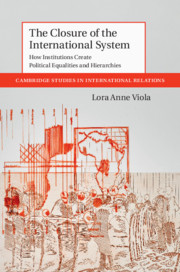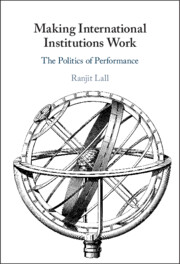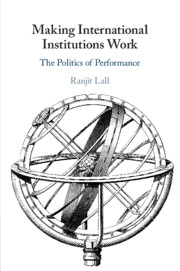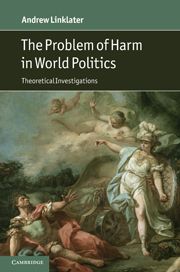The Closure of the International System
As global governance appears to become more inclusive and democratic, many scholars argue that international institutions act as motors of expansion and democratization. The Closure of the International System challenges this view, arguing that the history of the international system is a series of institutional closures, in which institutions such as diplomacy, international law, and international organizations make rules to legitimate the inclusion of some actors and the exclusion of others. While international institutions facilitate collective action and common goods, Viola's closure thesis demonstrates how these gains are achieved by limiting access to rights and resources, creating a stratified system of political equals and unequals. The coexistence of equality and hierarchy is a constitutive feature of the international system and its institutions. This tension is relevant today as multilateral institutions are challenged by disaffected citizens, non-Western powers, and established great powers discontent with the distribution of political rights and authority.
- Provides a contrast to the widely held idea that the system has been expanding or - in more recent vocabulary - globalizing over time
- Offers a dynamic theory to explain why apparent 'progress' in extending sovereign equality rights to new actors does not eliminate hierarchy
- Provides a basis for thinking about questions of global justice in light of recent crises in the multilateral institutional order
Reviews & endorsements
‘In this outstanding book, Lora Ann Viola shows that inclusion and exclusion are two faces of the same coin. Institutional processes that foster equality in world politics inevitably enshrine forms of inequality in parallel. This insightful argument makes for a particularly lucid account of the tragic and antagonistic nature of international history and society.' Vincent Pouliot, James McGill Professor, Department of Political Science, McGill University
‘The Closure of the International System is a must-read for anyone interested in understanding the broad changes in global governance since the emergence of the modern state-system. Viola skillfully builds on the Weberian idea of social closure to offer an innovative and comprehensive theoretical approach that explains simultaneous trends towards greater equality and inequality in world politics. The long historical time-frame and detailed accounts of the evolution of diplomacy, international law, and international organizations offer convincing evidence to support the study's main arguments. Through an excellent mix of theoretical analysis and empirical evidence, the book generates important insights regarding potential future developments in international relations.' Alexandru Grigorescu, Professor, Department of Political Science, Loyola University Chicago
‘Lora Anne Viola has written what will certainly become the go-to text for anyone interested in international clubs and social closure in the international system. Theoretically rich and historically well-grounded, this book is also an absolute pleasure to read. I have been recommending it everyone since I first came across it…' Ayşe Zarakol, Reader in International Relations, University of Cambridge
'Sovereign equality and institutionalized inequality are two sides of the same coin. In this theoretically deep and historically rich book, Lora Viola shows masterfully the complex dynamics of the institutionalization of sovereignty, diplomacy and international cooperation. An excellent book.' Michael Zürn, Director of the research unit Global Governance, WZB Berlin Social Science Center, and Professor of International Relations, Freie Universität Berlin
‘... the book’s provocative argument and wide-ranging applications provide fertile ground for studies of hierarchy in international relations, like its author intended.’ Marina G. Duque, International Relations
‘The book develops a closure theory to explain why the rules and institutions of the international system exhibit this mix of equality and inequality of rights and privileges.’ G. John Ikenberry, Foreign Affairs
'… Bertrand shows that negotiation is a better way to manage separatist challenges than repression.' Andrew J. Nathan, Foreign Affairs
Product details
July 2020Adobe eBook Reader
9781108661010
0 pages
This ISBN is for an eBook version which is distributed on our behalf by a third party.
Table of Contents
- 1. False promises of universalism: the interdependent logics of equality and inequality in the international system
- 2. The closure thesis: social closure, club dynamics, and stratification in the international system
- 3. 'The master institution': diplomacy, practices of closure, and the emergence of an international system in early modern Europe
- 4. 'Dwarves and giants': international law, the monopolization of sovereign rights, and stratification in the international system
- 5. International organizations: between sovereign equality and the institutionalization of inequality
- 6. What remains of the promise of equality?
- Index.









